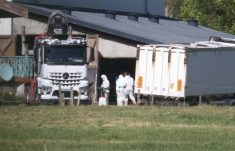The University of Lethbridge will use $1.1 million in federal funds to see if biochar in beef cattle diets will reduce the amount of methane gas expelled.
Biochar is charcoal produced from plant matter. The bulk of recent research on the material has focused on use in soil as a way to sequester carbon, but there are also studies on its benefits in cattle and poultry feed.
The federal agriculture department announced the funding July 11 as part of $27 million spent Canada-wide on 20 new research projects involving agricultural greenhouse gases.
Read Also

U.S. livestock: Cattle fall sharply as Trump says he’s working to lower beef costs
Chicago cattle futures fell sharply on Friday after U.S. President Donald Trump said his administration was working to lower the…
According to a government news release, “the program supports research into greenhouse gas mitigation practices and technologies that can be adopted on the farm.”
Federal Agriculture Minister Lawrence MacAulay said the investments are part of the government’s efforts to address climate change.
Erasmus Okine, vice-president of research at the U of L, welcomed the funds.
“Reducing the amount of greenhouse gases produced by the cattle sector is important both environmentally, economically and helps build public trust. Producers want to operate in a sustainable fashion and our study results will help them do that,” he said in the release.













